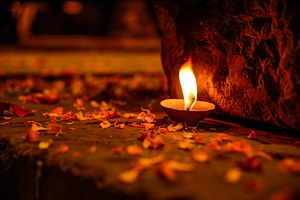On June 12, an elderly Hindu man was beaten by a policeman in Pakistan’s province of Sindh for allegedly eating during the holy Islamic month of Ramadan. Later, the victim was reportedly forced to reconcile and resolve the issue out of court.
At the time of the partition of British India, Hindus represented almost 15 percent of Pakistan’s population; now, however, their representation has come down to less than 2 percent. In 2014, a Hindu lawmaker told the National Assembly that every year about 5,000 Hindus flee Pakistan to avoid persecution. There have been consistent reports of forced conversions of Hindu girls to Islam. A madrasa (religious school) in Sindh, called Dargah Alia Qadria Bharchundi Sharif, has openly made claims about its aim of converting at least 2,000 Hindu girls to Islam.
The Hindu community in Pakistan was never truly accepted or trusted by the state. Among other things, this has remained evident in the curriculum taught in the country’s public schools, which openly fosters intolerance of the community. The curriculum of several subjects taught in public schools, including Urdu, history, and Islamic studies, is filled with prejudice and hate-mongering against Hindus. A study analyzing the country’s textbooks from grade 1-10 concluded that “Hindus are repeatedly described as extremists and eternal enemies of Islam whose culture and society is based on injustice and cruelty, while Islam delivers a message of peace and brotherhood, concepts portrayed as alien to the Hindu.”
Moreover, a chapter on the ideology of Pakistan taught in grade 7 offers a strong connection between the foundation of Pakistan and alleged atrocities committed by Hindus: “The Hindu belief was that only a Hindu nation could live in the Indian subcontinent. Other nations should become a part of the Hindu nation or leave India. Many Hindu extremist parties such as the Arya Samaj were working against Muslims since the nineteenth century and even after fifty years after the creation of Pakistan, these organizations continue working to erase the Muslims’ existence from the region.”
The state has always tried to play down the persecution of Hindus in the country largely due to its protracted conflict with India. Hindus in Pakistan are generally seen as agents of the Indian security agencies and are seen as Indians. Pakistani lawmakers’ criticism and condemnation of India often turns into condemnation of Hindus everywhere, including in Pakistan. According to a Hindu activist, acts of violence against the Hindu community in Pakistan are always justified in retaliation for alleged Indian atrocities in Kashmir and other violence against Muslims, including the 2002 Gujarat riots: “Attacks on Muslim minorities in India in no way justify the atrocities committed against the Hindu minority living in Pakistan — two wrongs cannot make a right,” said the activist.
Besides, due to the growing religious radicalization and intolerance in the country, Pakistani Hindus live under constant threat. Like many other religious minorities, they remain the target of militant groups and are victimized by the state’s discriminatory laws. Pakistan’s nationalism and identity have been defined in opposition to a “Hindu India,” which, as projected by the state in its national narrative, never accepted Pakistan’s creation and has always tried to devour it. The dissemination of this narrative on the national level has made the lives of Pakistani Hindus even more difficult; this reality doesn’t just invite religious persecution, but also cultural and political oppression.
However, since the formation of the National Action Plan (NAP) – a twenty point strategy to fight extremism in the country – there have been some encouraging developments, which suggest that the country might be reconsidering its discriminatory approach toward religious minorities, particularly the Hindus. “I am a prime minister of all communities,” remarked Pakistani Prime Minister Nawaz Sharif while attending a Diwali festival in Karachi last year. A few months ago, the Sindh assembly passed the Hindu Marriage Bill, codifying the marriages of thousands of Hindus in the country. On June 20, in an unprecedented move, the police in Sindh province arrested a Muslim man under the country’s blasphemy laws for selling shoes with a sacred Hindu symbol inscribed on it.
Despite these encouraging developments, the persecution of the Hindu community in Pakistan is not likely to stop unless the country overhauls its approach of defining nationalism, which proscribes Hindus as pariahs.

































